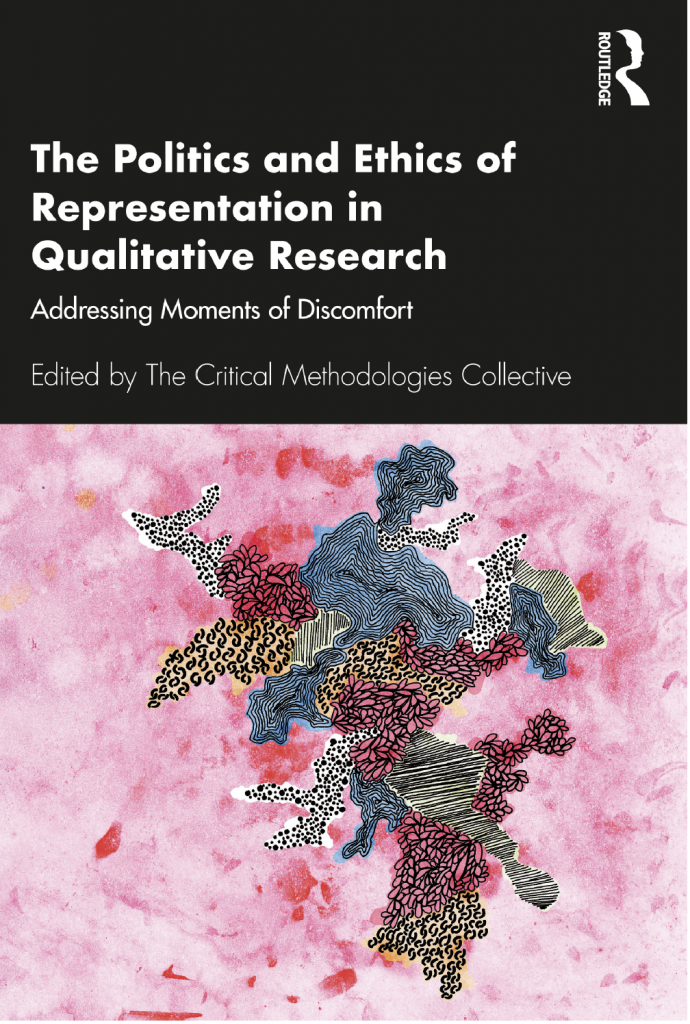By the Critical Methodologies Collective.
The Politics and Ethics of Representation in Qualitative Research (2021), published in July by Routledge, draws on experiences from nine different PhD projects. These have been brought together by our Critical Methodologies Collective to offer insights into the politics and ethics of representation for researchers working on justice struggles. Moments of discomfort in the qualitative research process provide important sites of knowledge for exploring representational practices. We argue that these moments help us gain essential insights into the methodological, theoretical, ethical and political issues crucial for the fields with which we engage. While the moments of discomfort opened up in this book are specific to our particular research processes, we hope that they will resonate with similar dilemmas in other fields and contexts and disciplines.

Grounded in empirical research, the book is relevant to students, postgraduates, researchers, practitioners, activists and others dealing with methodological dilemmas from a critical perspective. Instead of ignoring discomforts or describing them as solved, we stay with them, showing how such a reflective process provides new and ongoing insights. Working on this book has involved not only countless collective writing days and a collaborative editorial process but also workshops with some of the scholars who inspire us, namely: Bridget Anderson (June 2019); Yasmin Gunaratnam (August 2019); Johanna Esseveld (January 2020); and Diana Mulinari (June 2020).
All our studies are politically committed to different struggles for social justice: from queer recognition of non-binary sex characteristics, through asylum rights and migrants’ rights, to antiracist critique. In some chapters, ethical and political dilemmas related to representational practices are analysed as experienced in fieldwork. In others, the focus is on the production of representation at the stage of writing. Meanwhile others draw parallels between these stages. The book deals with questions such as: what does it mean to write about the lives of others? How are the ethics and politics of representation intertwined, and how are they distinct? How are the politics of representation linked to a practice of solidarity in research? What are the im/possibilities of hope and care in research?
These questions are considered in terms of accountability. Representational practices in research, like any other representational practices, always involve a process of translation. Such a process carries with it the inherent violence of transformation, reduction or obliteration. In so doing, it opens up the dilemmas of the ethics of representation. Such general questions of research ethics should, however, not be divorced from those concerning research politics. As we have learned from work on representation in the feminist, critical and postcolonial field, these processes are deeply implicated in the power relations of societies in which the research is taking place. In this sense, creating a representation is always a political endeavour – and likewise for critical research concerned with issues of justice.
Structuralist and semiotic traditions teach us how representational practices operate, while critical, feminist and postcolonial traditions encourage us to contextualise these practices in particular historical moments to explore how they impose, maintain or resist unjust social structures. Thus, accountability for us is about being accountable towards both individuals (research participants) and the justice project in which we are engaged. In many of the projects discussed in this book, this question is complicated by the fact that researchers often face competing or even conflicting accountabilities. Most importantly, tensions might occur between accountability towards the research participants and accountability towards political struggles in which the research project is situated.
Representation is also analysed in relation to solidarity and accountability. Some key questions that we pose to ourselves in this context are: what modes of representation are both ethically accountable to those represented in the study and politically accountable in the context of contentious struggles for justice? Furthermore, what if these two types of accountabilities not only diverge but even remain in tension? What stories are we to tell, how do we tell them, and how do we ‘get hold of them’? These questions are also related to the very production of this book. Signing the agreement with the publisher required us to reflect upon: how would we resolve the editorship with several members? Who should stand as editors? Furthermore, how could the ideals of working as a collective be translated into the legal language of copyrights and liabilities?
These questions required us to recollect the beginning and making of this group. The Collective started as a small group of doctoral students in 2012 who met regularly to read and discuss texts from queer, feminist, materialist and decolonial/postcolonial scholars that helped us situate, problematise and liberate our research practices and discomforts. This process helped us articulate what was necessary for the group and what visions we had in collective writing. However, it also showed that going against the norm in academic publishing requires not only inventiveness but also extra labour. Thus, we decided that the Collective stands as overall editor of the book and author of some individual chapters. To make this formally possible, we registered the Collective as a legal association.

